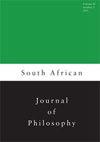Divine violence as non-violent violence: A critique of Judith Butler
IF 0.2
3区 哲学
0 PHILOSOPHY
引用次数: 0
Abstract
The question of violence and how society can emancipate oneself from it has occupied many philosophers. Walter Benjamin attempted to answer this question in 1920 through the notion of divine violence. This idea has recently been resurrected by philosophers such as Jacques Derrida, Jürgen Habermas, Slavoj Žižek and Judith Butler. Divine violence is turned to as a means of emancipating society from systemic oppression and coercive law. However, it is a notion that has been met by major critiques. Most notable is Jacques Derrida’s critique given in Force of Law: The Mystical Foundations of Authority. This article examines Judith Butler’s turn to divine violence in opposition to the critique of divine violence given by Derrida. Butler attempts to merge divine violence and non-violence to create a means of non-violent revolution capable of emancipating society from oppression and coercive law. However, to make this argument, Butler needs to overcome Derrida’s objection that suggests that divine violence is a dangerous notion with the potential to justify horrendous forms of political violence. Does Butler successfully create a non-violent divine violence capable of achieving this desired emancipation? Or does divine violence continue to be a notion with a dangerously destructive potential as Derrida suggests? These are the questions that this article attempts to answer through a detailed examination of both Butler’s and Derrida’s work on divine violence. Ultimately, it is established that divine violence should be jettisoned into the realm of the divine, rather than harnessed for political ends.作为非暴力暴力的神圣暴力:对朱迪思·巴特勒的批判
暴力以及社会如何从暴力中解放出来的问题一直困扰着许多哲学家。Walter Benjamin在1920年试图通过神性暴力的概念来回答这个问题。最近,雅克·德里达(Jacques Derrida)、约尔根·哈贝马斯(jrgen Habermas)、斯拉沃伊Žižek和朱迪思·巴特勒(Judith Butler)等哲学家重新提出了这一观点。神的暴力变成了将社会从系统压迫和强制性法律中解放出来的一种手段。然而,这一观点遭到了主要的批评。最值得注意的是雅克·德里达在《法律的力量:权威的神秘基础》一书中所作的批判。本文考察了朱迪思·巴特勒对神性暴力的转向,以反对德里达对神性暴力的批判。巴特勒试图将神圣的暴力与非暴力结合起来,创造一种能够将社会从压迫和强制性法律中解放出来的非暴力革命手段。然而,为了提出这个论点,巴特勒需要克服德里达的反对意见,德里达认为,神的暴力是一个危险的概念,有可能为可怕的政治暴力形式辩护。巴特勒是否成功地创造了一种非暴力的神圣暴力,能够实现这种渴望的解放?还是像德里达说的那样,神圣的暴力仍然是一个具有危险破坏性的潜在概念?这篇文章试图通过对巴特勒和德里达关于神性暴力的作品的详细考察来回答这些问题。最终,它确立了神圣的暴力应该被抛弃在神圣的领域,而不是被用于政治目的。
本文章由计算机程序翻译,如有差异,请以英文原文为准。
求助全文
约1分钟内获得全文
求助全文
来源期刊

SOUTH AFRICAN JOURNAL OF PHILOSOPHY
PHILOSOPHY-
CiteScore
1.00
自引率
0.00%
发文量
19
期刊介绍:
The South African Journal of Philosophy (SAJP) is the official publication of the Philosophical Society of South Africa. The aim of the journal is to publish original scholarly contributions in all areas of philosophy at an international standard. Contributions are double-blind peer-reviewed and include articles, discussions of articles previously published, review articles and book reviews. The wide scope of the South African Journal of Philosophy makes it the continent''s central vehicle for the publication of general philosophical work. The journal is accredited with the South African Department of Higher Education and Training.
 求助内容:
求助内容: 应助结果提醒方式:
应助结果提醒方式:


